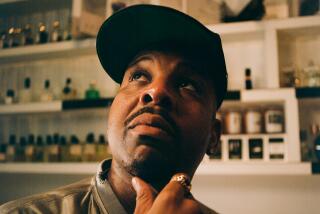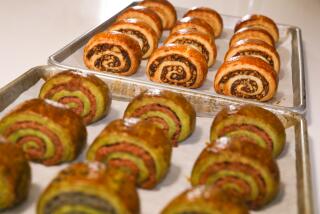Syrians Are Making Cheap Exotic Perfumes and Enjoying Sweet Smell of Success
- Share via
DAMASCUS, Syria — Amid the bustle of the souks of old Damascus, Syria’s scent makers mix and match their potions to create while-you-wait perfumes that combine the best of East and West.
From a subtle Syrian version of Chanel No. 5 to the pungent aroma of Indian patchouli, scent makers like Talal Kanbarieh offer their customers a range of exotic choices at bargain prices.
“It just needs some taste, art and a bit of scientific knowledge,” said Kanbarieh, 40, whose small shop is a haven of tranquility amid the hubbub of the crowded Al-Bzourieh souk.
As the tang of spices from neighboring herb shops mingled with the aromas of the essences and extracts around him, Kanbarieh deftly combined ingredients to produce a bottle of one of the world’s favorite scents, jasmine.
Matter of Minutes
Within 20 minutes, Kanbarieh made six different perfumes for a group of four Italian tourists. The 36 grams of scent cost them just $4.
“I’ve never seen another place like this,” said Marcella Baracco, one of the tourists, as she tucked her purchases into her handbag. “If I bought these in Italy or France they would cost me a fortune.”
Among Kanbarieh’s expanding repertoire of perfumes are ones based on famous brands like Aramis, Givenchy, Monsieur Rocha or Opium--some of which are also mimicked and sold cheaply in the United States.
Kanbarieh, who learned his trade from his father, said most souk scent makers produce traditional Middle Eastern perfumes, Western perfumes with a dash of Oriental flavor, or Indian-style perfumes like patchouli.
“The most popular ones are the Middle Eastern perfumes such as jasmine and Arabian rose,” said Kanbarieh, who studied chemistry for two years before taking over his father’s shop 20 years ago.
Collecting the Oil
He said the first step in making perfume is to soak flowers in water until the oil leaches out and collects on the surface.
“The oil is then collected as essence and put in a dark bottle to avoid light. The remaining perfumed water is used in making cosmetics, for certain sweets and as a base for cologne,” Kanbarieh said.
To make European-style perfumes, he imports essence from such countries as France and Switzerland.
“The essence is brought from Europe and is mixed here by us with certain alcohols and Middle Eastern essences to produce replicas of that perfume,” he said.
He said his prices were set to match the average Syrian’s standard of living.


